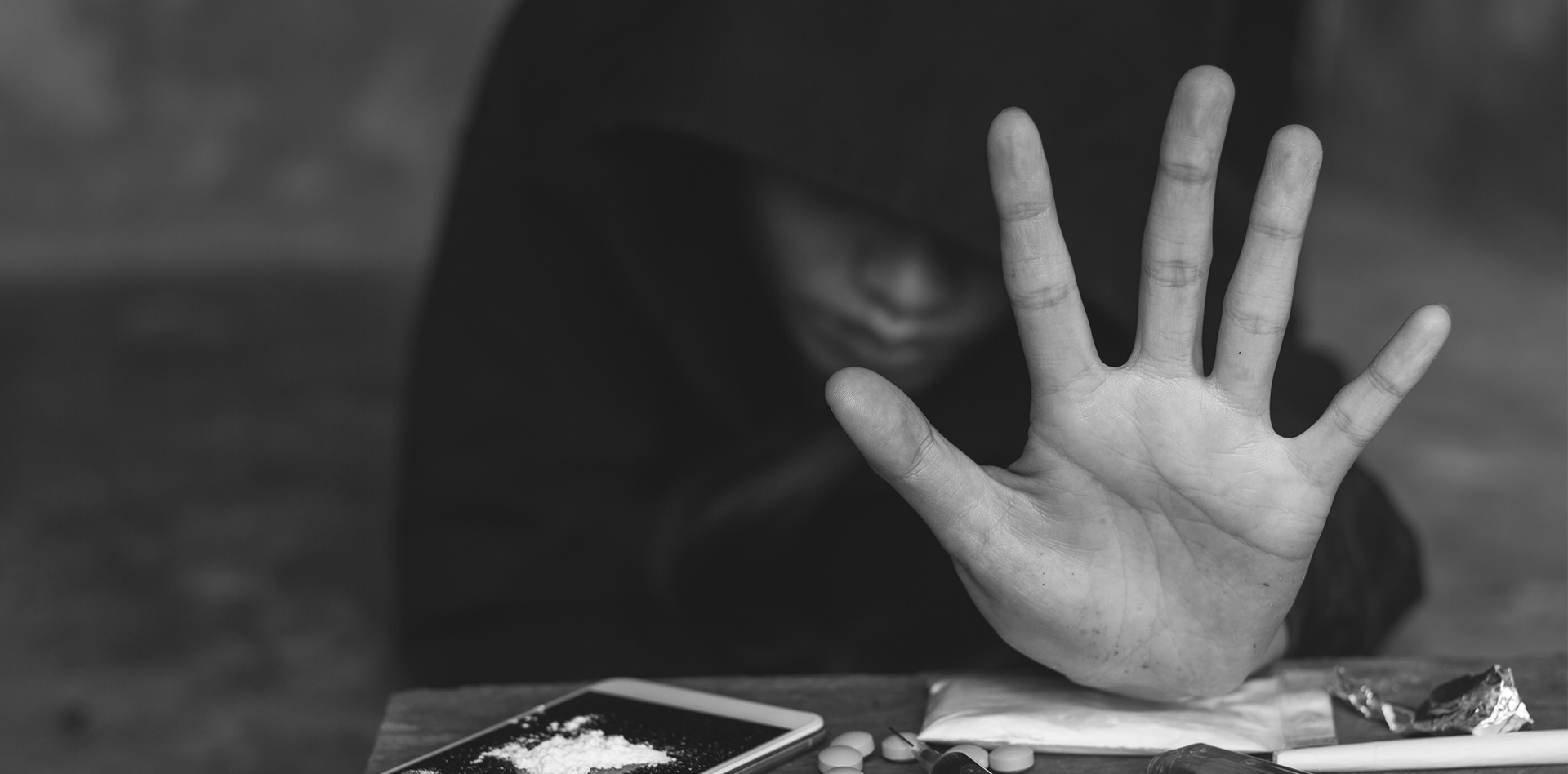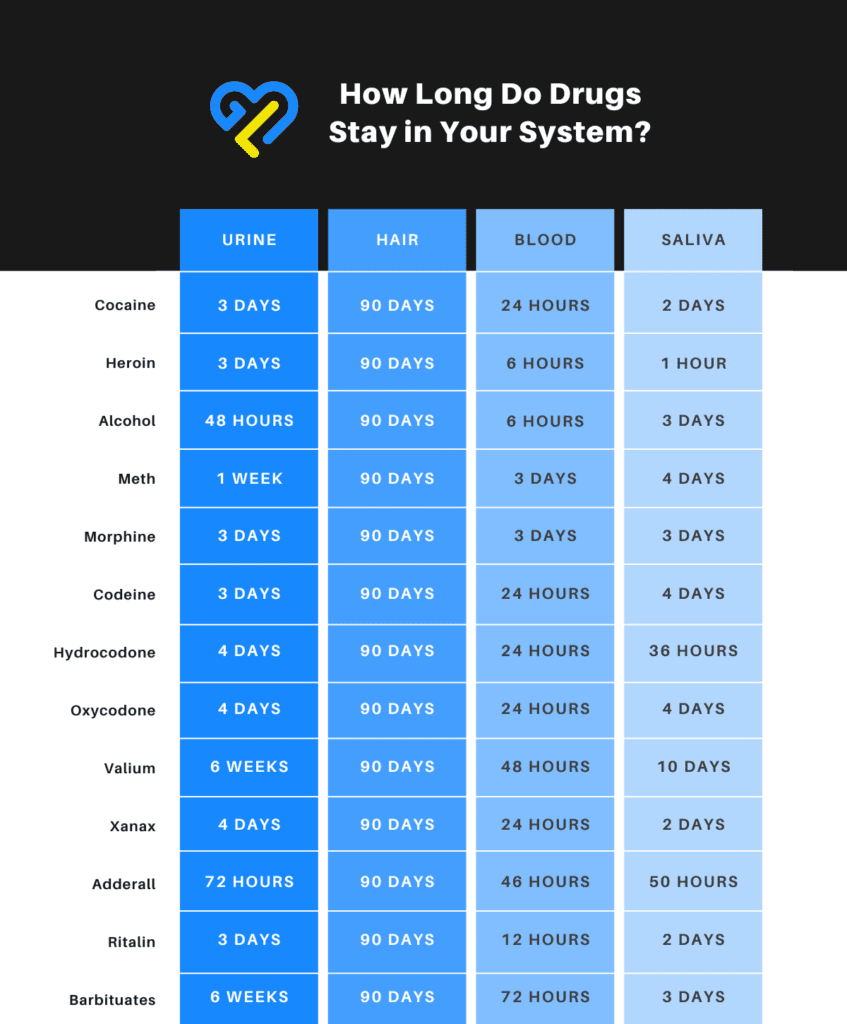
Home » Drug Addiction » How Long Do Drugs Stay in Your System
How Long Do Drugs Stay in Your System?
If you find yourself searching “how long do drugs stay in your system,” there may be a deeper issue at hand—an addiction. At Gratitude Lodge, we understand the importance of drug test awareness and its potential to serve as a wake-up call. In this guide, we will explore the duration of drug detection in various tests and show those seeking to overcome addiction how to connect with the help they need.

Urine Test
Blood Test
Saliva Test
Hair Test
How Long Are Drugs Detected in Your System?
The effects and presence of drugs in the body vary significantly. Just as the duration of a drug’s high differs, so does the length of time it remains detectable in the body’s systems. Understanding the detection window of drugs, such as how long does Klonopin stay in your system, is crucial, especially for those facing drug tests.
How long do drugs stay in system depends on factors that include:
- Type of drug(s) used
- Amount of drug(s) used
- Type of drug test
- Frequency of use
- Hydration levels
- Body mass
- Physical activity
- Drug tolerance
- Metabolic rate
- Medical conditions that impact drug elimination
- Presence of other drugs or alcohol
- Ethnicity
- Gender
- Weight
- Elimination half-life of the drug
Drug tests are conducted for a variety of reasons, including probation, legal cases, custody battles, divorce proceedings, employee screening, and court-ordered tests. Athletes are also subject to urine drug screens to ensure fair competition and detect the use of performance-enhancing drugs.
Different types of drug tests are employed based on their specific objectives. Let’s explore the most common ones, starting with how long do drugs stay in urine.
How Long Do Drugs Stay in Your System Chart

How Long Do Certain Drugs Stay in Your System
Illicit Drugs
Cocaine
Cocaine, a potent stimulant, can have varying effects on the body and mind. The detection times for cocaine in different methods are as follows:
Urine: 3 days
Hair: 90 days
Blood: 24 hours
Saliva: 2 days
Heroin
Heroin, a highly addictive opiate, poses serious health risks, including addiction and life-threatening overdose. Here are the detection times for heroin:
Urine: 3 days
Hair: 90 days
Blood: 6 hours
Saliva: 1 hour
Alcohol
Alcohol is a widely consumed substance that can impair judgment. Consider these detection times for alcohol:
Urine: 48 hours
Hair: 90 days
Blood: 6-12 hours
Saliva: 3 days
Meth
Methamphetamine, a powerful stimulant, can have devastating effects on individuals. Here are the detection times for how long meth stays in the system:
Urine: 1 week
Hair: 90 days
Blood: 3 days
Saliva: 4 days
Prescription Drugs
Prescription drugs, including opioids, require careful monitoring due to their potential for misuse. Here are the detection times for some commonly abused prescription drugs:
Opioids
The timeframe for the detection of opioids depends on the specific drug, the frequency and quantity of use, metabolism, and body fat. Common examples include:
Morphine
Urine: 3 days
Hair: 90 days
Blood: 3 days
Saliva: 3 days
Codeine
Urine: 3 days
Hair: 90 days
Blood: 3 days
Saliva: 3 days
Hydrocodone
Urine: 4 days
Hair: 90 days
Blood: 24 hours
Saliva: 36 hours
Oxycodone
Urine: 4 days
Hair: 90 days
Blood: 24 hours
Saliva: 36 hours
Benzodiazepines
Benzodiazepines, commonly referred to as benzos, are another class of prescription drugs that include Valium and Xanax. These medications are prescribed to treat anxiety and sleep disorders but can also be misused, leading to addiction and dependence. Let’s take a look at how long Xanax stays in your system.
Prescription Stimulants
Stimulants such as Adderall and Ritalin, are commonly prescribed for the treatment of ADHD (attention deficit hyperactivity disorder). That said, their misuse or unauthorized use without a prescription can lead to serious health risks and addiction. It is important to use these medications under the guidance of a healthcare professional and learn how long Adderall stays in your system.
Valium
Urine: 6 weeks
Hair: 90 days
Blood: 48 hours
Saliva: 10 days
Xanax
Urine: 4 days
Hair: 90 days
Blood: 24 hours
Saliva: 2 days
Adderall
Urine: 72 hours
Hair: 90 days
Blood: 46 hours
Saliva: 50 hours
Ritalin
Urine: 2 days
Hair: 90 days
Blood: 12 hours
Saliva: 2 days
Get Help for Drug Addiction Today at Gratitude Lodge
Escape the grip of drug addiction and embark on a transformative journey towards a brighter future. At Gratitude Lodge in Southern California, we offer a unique sanctuary for healing, where our pet-friendly rehab centers are dedicated to your complete recovery from substance abuse in Newport Beach and Long Beach.
If you’re interested in learning how long other drugs last in your system, like how long fentanyl stays in your system or how long Percocet stays in your system, continue reading the guides on our website.
Your journey to recovery is as unique as you are, which is why we create a personalized treatment plan drawing from a comprehensive range of evidence-based interventions:
- Benefit from MAT (medication-assisted treatment) for effective support
- Engage in transformative talk therapies such as CBT or DBT in psychotherapy sessions
- Find strength in the support of group counseling sessions
- Receive one-on-one guidance through individual counseling
- Rebuild relationships and foster healing through family therapy
- Embrace holistic therapy approaches to nurture your mind, body, and spirit
As you near the end of your treatment program, Gratitude Lodge ensures a smooth transition to a less intensive form of therapy or offers the option of our supportive sober living environment. Equipped with relapse prevention strategies and a comprehensive aftercare plan, you’ll leave Gratitude Lodge empowered to maintain your newfound sobriety.
Don’t Let Drug Addiction Hold You Back
Recover from Drug Addiction with Gratitude Lodge
DRUG ADDICTIONS WE TREAT
Our Partners
WE ACCEPT MOST PPO INSURANCE
Drug and alcohol detox should be accessible to everyone. At Gratitude Lodge,
we work with most insurance plans to cover the costs of treatment.
RELATED ARTICLES - DRUG ADDICTION
Drug Addiction FAQs
Yes, drug addiction is recognized as a chronic disease by many medical and scientific organizations due to its effects on the brain and behavior. Drug addiction is characterized by compulsive drug seeking and use despite harmful consequences.
Drug addiction is a chronic and complex brain disorder which can lead to significant physical, emotional, and social problems. It is often accompanied by changes in the brain’s chemistry and structure that can persist even after drug use stops.
A drug addict is a person who has developed a chronic and compulsive pattern of drug seeking and use despite the negative consequences it has on their health, relationships, and other areas of life. This behavior is often fueled by changes in the brain that occur with drug use, which can make it difficult for individuals to control their use of drugs or stop using them altogether once addiction develops.
Common signs of a drug addict include tolerance, withdrawal symptoms, inability to control use, and neglecting personal and professional commitments. Drug addiction is also associated with physical signs like poor personal hygiene standards and changes in appearance.
Data from NSDUH 2021 shows that heroin is the most addictive drug. Of 1.1 million U.S. adults who reported using heroin in 2021, over 1 million developed a diagnosable heroin addictive in the same year. The second most addictive drug according to the same data is meth. Of the 2.5 million U.S. adults who reported using meth in 2021, 1.5 million developed a meth addiction in the same year.
If you are concerned that your loved one may be struggling with addiction, there are several signs and symptoms that you can look for:
- Changes in behavior: Have you noticed significant changes in your loved one’s behavior, such as increased secrecy, withdrawal from friends and family, or mood swings?
- Physical symptoms: Have you noticed any physical symptoms, such as changes in appetite, sleep patterns, or weight?
- Neglecting responsibilities: Have you noticed that your loved one has started to neglect their responsibilities at work, school, or home because of their drug or alcohol use?
- Financial difficulties: Has your loved one started to experience financial problems because of their drug or alcohol use?
- Legal problems: Has your loved one experienced any legal problems like arrests, fines, or incarceration, because of their drug or alcohol use?
- Social isolation: Has your loved one started to withdraw from friends and family, or avoid social situations, because of their drug or alcohol use?
- Continued use despite negative consequences: Has your loved one continued to use drugs or alcohol even when they’ve experienced negative consequences, such as legal problems, financial difficulties, or health issues?
It can be challenging to determine whether you are struggling with addiction on your own. I, If you are concerned that you may have a problem with drugs or alcohol, though, there are several signs and symptoms that you can watch out for:
- Cravings: Do you experience strong urges to use drugs or alcohol, even when you try to resist them?
- Tolerance: Do you need to use more drugs or alcohol to achieve the same effects that you used to experience with smaller amounts?
- Withdrawal symptoms: Do you experience physical or emotional symptoms when you try to stop using drugs or alcohol – nausea, sweating, tremors, anxiety, or depression, for example?
- Loss of control: Do you find yourself using drugs or alcohol more often than you intended, or in larger amounts than you planned?
- Neglecting responsibilities: Have you started to neglect your responsibilities at work, school, or home because of your drug or alcohol use?
- Social isolation: Have you started to withdraw from friends and family, or avoid social situations, because of your drug or alcohol use?
- Continued use despite negative consequences: Have you continued to use drugs or alcohol even when you’ve experienced negative consequences, such as legal problems, financial difficulties, or health issues?

If you are struggling with a drug addiction and need help, do not waste any more time. Reach out right now to the drug treatment center at Gratitude Lodge for the help that you desperately need and deserve.

















